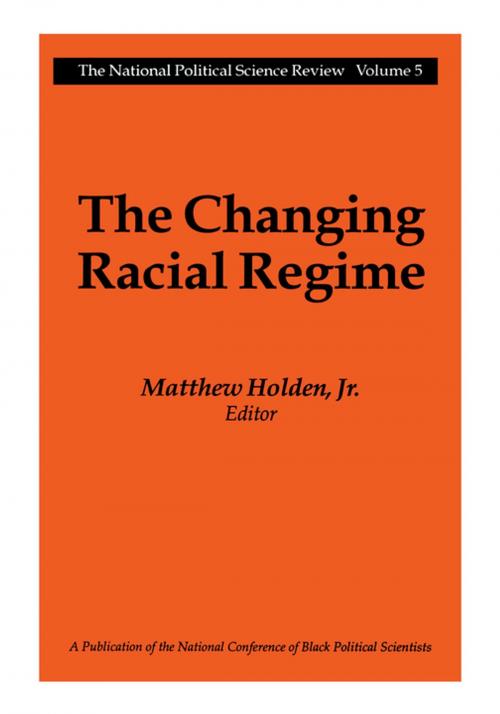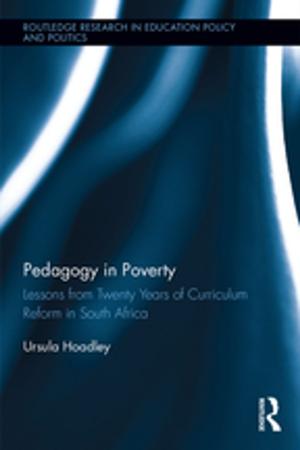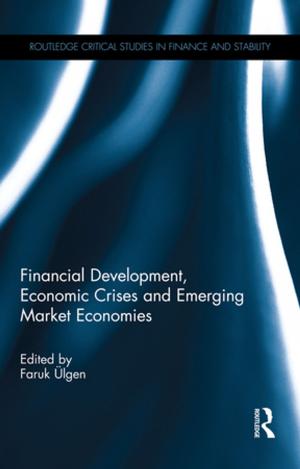The Changing Racial Regime
Nonfiction, Social & Cultural Studies, Social Science, Discrimination & Race Relations, Political Science| Author: | Matthew Holden | ISBN: | 9781351305105 |
| Publisher: | Taylor and Francis | Publication: | November 30, 2017 |
| Imprint: | Routledge | Language: | English |
| Author: | Matthew Holden |
| ISBN: | 9781351305105 |
| Publisher: | Taylor and Francis |
| Publication: | November 30, 2017 |
| Imprint: | Routledge |
| Language: | English |
The National Political Science Review is the official publication of the National Conference of Black Political Scientists. The Review's purpose, as described by Matthew Holden in his introduction, is to "lead to new information, insights, and findings" into the social and political status of African Americans. The volume is not exclusionist or narrow. It integrates essays that could stand alone, as they initially were written, according to the method and theory of the author in question. As presented here, however, they also lend themselves to a broader treatment of race and the political order. The present volume combines essays expressly focused on African Americans, Africa, and the African diaspora. At the same tune, it contains essays about broad generic subjects such as budgeting and interest groups, written with no explicit racial relevance. Holden integrates these essays under the theme of the changing racial regime.
The integrating concept is the old word "regime," which political scientists have used in many situations before to define such more or less persistent, though not necessarily permanent, orders of precedence. If no significant benefits and no significant burdens could be forecast by knowledge of the social identity called race, then the regime could be seen as non-racial. In American experience, the regime was, at one time, purposeful and sustained white advantage. The "white race" and its preferential standing, was central to virtually all institutional practice public and private. The significant contemporary question is the degree of change hi the racial regime. Some proceed with the assumption that a large degree of change has occurred in the American political system. The view of other contributors is that the system still sustains racial stratification. In its very internal dialogue, this volume presents a panorama of current work by political scientists, African American and other, on the character of the American political system.
Contributors include: Cedric Robinson, Charles Henry, Edward J. Muller, Marjorie Lewis, Katherine A. Hinckley and Bette S. Hill, Nancy Haggard-Gilson, and Vernon Johnson. The Changing Racial Regime is an essential resource for political scientists, black studies specialists, and scholars and policy analysts of race relations in the United States.
The National Political Science Review is the official publication of the National Conference of Black Political Scientists. The Review's purpose, as described by Matthew Holden in his introduction, is to "lead to new information, insights, and findings" into the social and political status of African Americans. The volume is not exclusionist or narrow. It integrates essays that could stand alone, as they initially were written, according to the method and theory of the author in question. As presented here, however, they also lend themselves to a broader treatment of race and the political order. The present volume combines essays expressly focused on African Americans, Africa, and the African diaspora. At the same tune, it contains essays about broad generic subjects such as budgeting and interest groups, written with no explicit racial relevance. Holden integrates these essays under the theme of the changing racial regime.
The integrating concept is the old word "regime," which political scientists have used in many situations before to define such more or less persistent, though not necessarily permanent, orders of precedence. If no significant benefits and no significant burdens could be forecast by knowledge of the social identity called race, then the regime could be seen as non-racial. In American experience, the regime was, at one time, purposeful and sustained white advantage. The "white race" and its preferential standing, was central to virtually all institutional practice public and private. The significant contemporary question is the degree of change hi the racial regime. Some proceed with the assumption that a large degree of change has occurred in the American political system. The view of other contributors is that the system still sustains racial stratification. In its very internal dialogue, this volume presents a panorama of current work by political scientists, African American and other, on the character of the American political system.
Contributors include: Cedric Robinson, Charles Henry, Edward J. Muller, Marjorie Lewis, Katherine A. Hinckley and Bette S. Hill, Nancy Haggard-Gilson, and Vernon Johnson. The Changing Racial Regime is an essential resource for political scientists, black studies specialists, and scholars and policy analysts of race relations in the United States.















